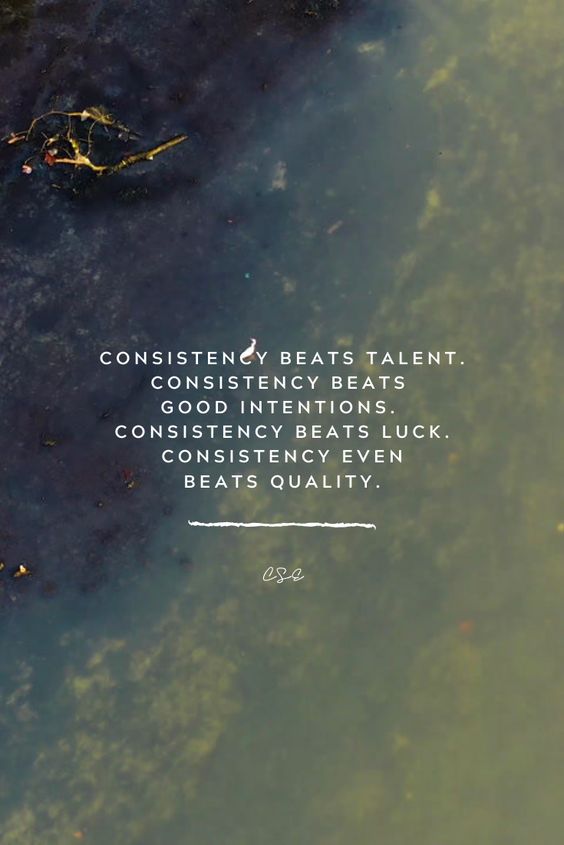“Consistency beats talent. Consistency beats good intentions. Consistency beats luck. Consistency even beats quality.”
Unknown
Beyond the Quote (96/365)
When does consistency beats talent?
Well, you have to be consistent enough to bridge the talent gap. The fact that somebody is ‘talented’ in a certain area implies that they have innate aptitudes, abilities, or skills that start them ahead of you. But just because somebody has a head start doesn’t mean that they are always going to win. In fact, this is the basic premise for every underdog story you’ve ever heard.
Somebody or some team starts ahead with natural advantages, they go up against a person or a team who, by all accounts shouldn’t win, yet, as a result of some consistency of effort, manage to come out on top. This is the story of the Tortoise and the Hare; it’s the story of the Tune Squad vs. the Monstars; it’s the plot behind every Rocky movie. When does consistency beat talent? When talent gets outworked.
When does consistency beat good intentions?
Well, every time. The problem with intentions is the fact that they never left your head. Intentions are nothing more than thoughts which, since we can’t read other people’s minds, are only real to you. We need to stop judging ourselves based on our intentions and judge ourselves the way we (the only way we ever could) judge others—based on actions. After all, actions are the manifestation of the thoughts THAT WON.
In the never-ending, ongoing debate that goes on in your head of what to do, what not to do, what to act on, and what to ignore, our thoughts are battling for the right to be acted on. If one thought prevails, we decide that it’s worth bringing to life—bringing into reality. If one thought remains as an intention, then we decide that it wasn’t quite worth it (for some reason known or unknown to you). Regardless, consistent mediocre (or even below average) action will always beat no action at all (which is really all intentions are).
When does consistency beat luck?
Well, it’s certainly possible that “blind luck” offers a small percentage of wins over consistency. Some people get lucky—there’s no doubt about that. But to “win” by luck, really isn’t anything worth celebrating or bolstering about is it? You don’t take a win that wasn’t of your doing and frame it on your wall, do you? You don’t talk about all of the really amazing times when “blind luck” made you win. You don’t put “blind luck” in your trophy case.
The real victories are the ones you manifest—the ones you command into reality based on your actions and hard work. Even better are the victories that took a LONG TIME to come to fruition—the ones that required incredible amounts of dedication and consistency in your life. Yes, when I think about luck, I like to think about it as Seneca described it, how luck is what happens when preparation meets opportunity.
In that context, consistency is going to win every time—because luck implies that the win came from forces outside of your control and so why would anything you did affect your luck if it was blind? No. Consistency gets you more ready than the one who waits for luck. Consistency puts you in a position to jump at that opportunity when it flashes in front of your eye for but a moment. Consistency will always place you closer to opportunity than waiting for luck will. And when opportunity comes, it will be funny to hear “luck” say that “consistency” just got lucky—sure thing.
When does consistency beat quality?
This goes back to talent and good intentions. What is talent but a higher quality starting point? A more talented painter is able to paint at a higher quality than an average painter; a more talented sports player is able to play at a higher quality than an average sports player; a more talented speaker is able to speak at a higher quality than an average speaker. The only problem with quality is when it doesn’t produce consistently enough—when it gets outworked.
The specifics, as they might be defined as to what is “quality” and how often the “quality” needs to be produced in order to “not get outworked” are very specific to the individual domains and fields. The major, underlying point worth noting however, is that you can’t let wanting to produce “quality” work stop you from producing consistently. When the “quality” work that you’re intending to produce is border-lining “perfectionism” then you know you might have a problem.
At a certain point, wanting to produce “quality” can become a crutch and an excuse to not produce because of underlying fears. The notion that we have to get past is that making errors is okay. Making mistakes on the things you produce is a part of the process. Nothing you ever produce will be perfect (you should say that again in your head a few more times). What the world needs more of is trial—not intention. More attempts—less holding back. More consistent drips—less grandiose plans for big dumps of a bucket.
So, what do we mean when we say consistency is the key?
Well, this does a pretty good job summing it up. Pick an aim. Chart the course of action. And stay consistent out there, folks. The key is in your hand.
Don't Let the Motivation Stop There...!
Join our newsletter and get the BEST of what we post every week. Here's an example. Like? Sign up.
[amp-optin id=42297]